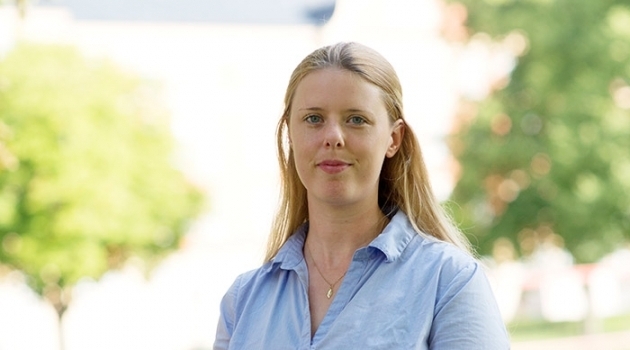Star researcher Karin Lind: Hoping for an exciting breakthrough
As one of six young researchers from around the world, Uppsala researcher Karin Lind has been awarded EUR 1.6 million and her own research team. These will be used to make advances in her research and her theories. At the end of the year she will be leaving Uppsala for the Max Planck Institute for Astronomy in Heidelberg, Germany.
'This is my first position as a researcher. It’s both pleasing and a challenge to put together my own research team and I’ll be the one designing the research we’ll be carrying out', says Karin Lind, researcher at the Department of Physics and Astronomy.
Her research involves looking at things that happened a very long time ago. She concentrates on stars created shortly after the Big Bang, which was about 13 billion years ago. Three elements arose from the Big Bang: hydrogen, helium and lithium. There is plenty of hydrogen and helium in the stars in the universe while some of the lithium seems to be disappearing somewhere. How did all the heavier elements arise and where is the lithium disappearing to? These are the questions Karin Lind wants to find the answers to.
The money Karin Lind will receive is a Sofia Kovalevskaya Award (bestowed by the Alexander von Humboldt Foundation). It is to suffice to keep her research team working for five years at a German university. Karin Lind was contacted personally by the Max Planck Institute for Astronomy who wanted her to apply for the funds jointly with them.
'It’s a very good offer. Otherwise I wouldn’t have accepted it. My plan was to carry on here in Uppsala but now I’ve been given this opportunity. In the long term, like many researchers, I’d like to have a permanent position. Of course, it will be an advantage for me to have led a research team', she says.
Karin Lind is looking forward to moving to Heidelberg even though she is actually quite tired of all the moving around. She grew up in Motala. When she was 19, she moved to Uppsala to become a student. Four years later in 2007, she was awarded a master’s degree in physics with an emphasis on astronomy. After this, she became a doctoral student at the European Southern Observatory in Munich. Her thesis was submitted to the Ludwig Maximilan Universität in 2010. From 2010 until 2013, she carried on as a post-doctoral researcher at the Max Planck Institute for Astrophysics. She then spent a year in Cambridge, UK, before returning to Uppsala in 2014.
At 13-14 years of age, Karin Lind discovered astronomy, and decided that it was what she wanted to work with. She talks about her interest in the night sky and her fascination with everything there is beyond the Milky Way.
'I’m very happy with my choice', she says.
What will you be doing at the Max Planck Institute in Heidelberg?
'I’ll carry on doing what I’m already doing but on a greater scale. All the things I haven’t had time to do yet. It will give me the opportunity to develop my theoretical models of stellar spectra so that we can use the better data to study the origin and development of the galaxy.'
Astronomy is believed to be the world’s oldest science. There is evidence for astronomical studies older than 4 000 years. There is still plenty to be discovered. Karin Lind considers it easy to find new approaches, very much due to advances in technology.
'The scale of the things we work on grows all the time. Twenty years ago, astronomers had to do everything themselves and could maybe look at ten stars at a time. Now with more powerful telescopes and breakthroughs on the theoretical side, we can see much further into space. We see many more stars and in greater detail. We can look for more elements and be more precise about how much there is of the various elements. These days, we can answer questions which we didn’t know were questions 20 years ago.'
There is much which will be new to Karin Lind at the Max Planck Institute for Astronomy in Heidelberg. Since it is a research institute she is going to and not a university with undergraduates, she will be able to dedicate herself whole-heartedly to her research projects.
What do you hope for?
'Of course I hope that we’ll make some exciting breakthroughs regarding the history of the Milky Way,' says Karin Lind.
Read more:
Link to the thesis
Karin Lind's Curriculum Vitae
About the Sofja Kovalevskaja Award
Elin Bäckström

